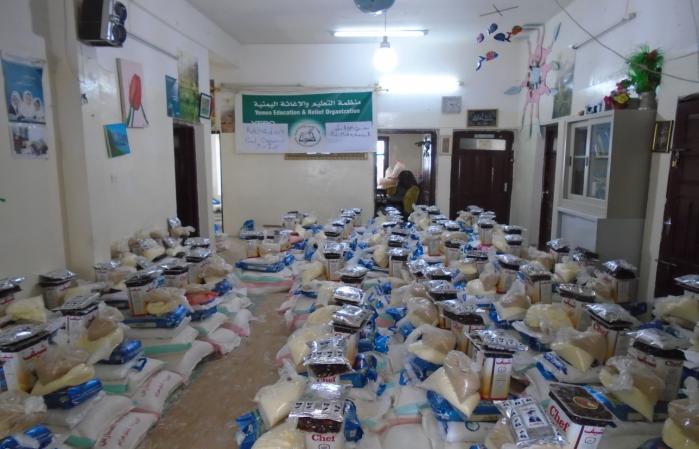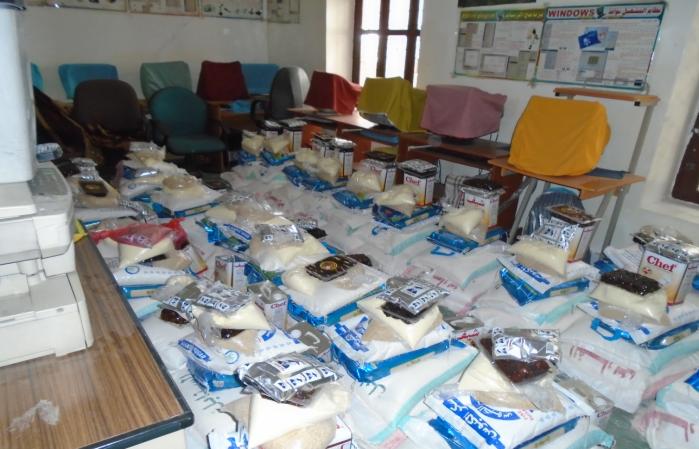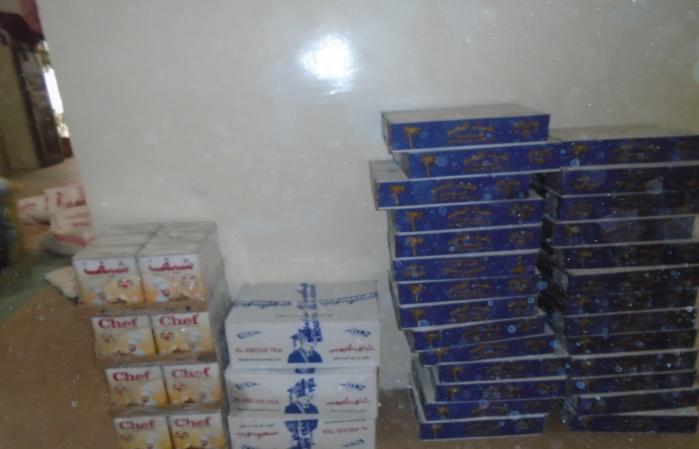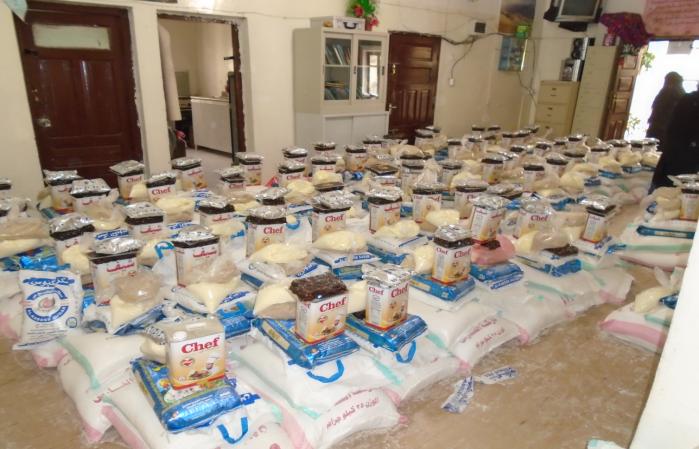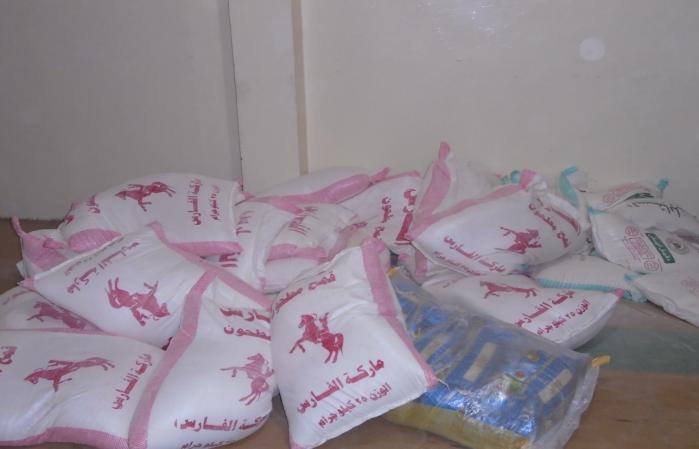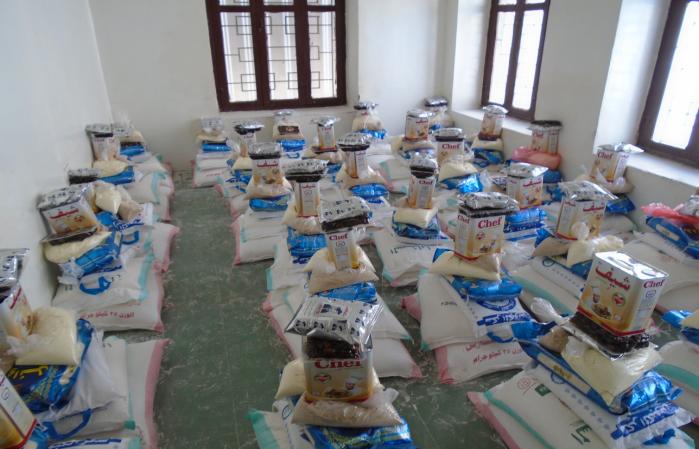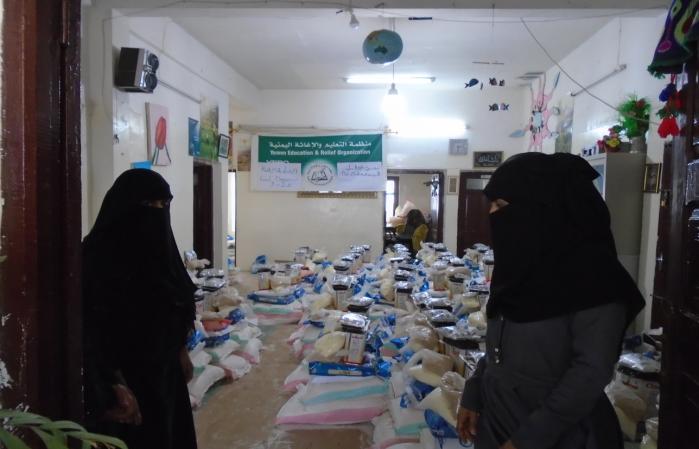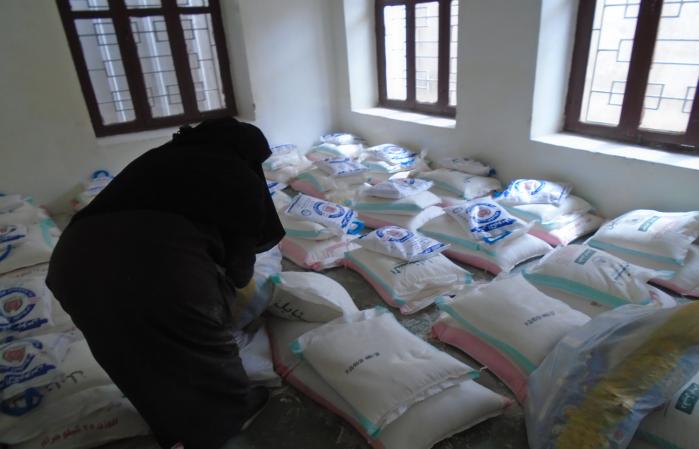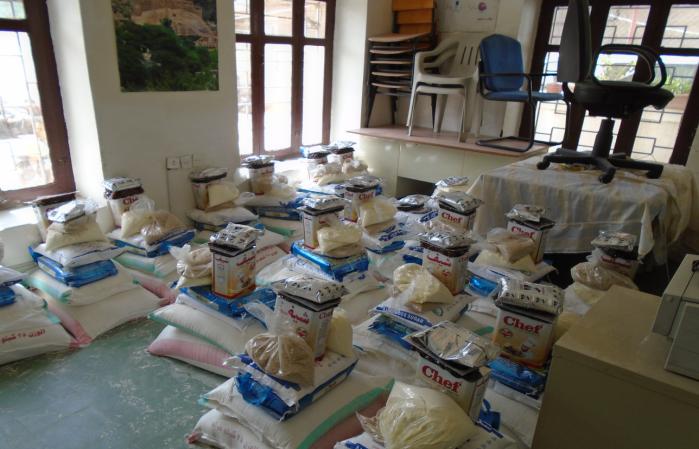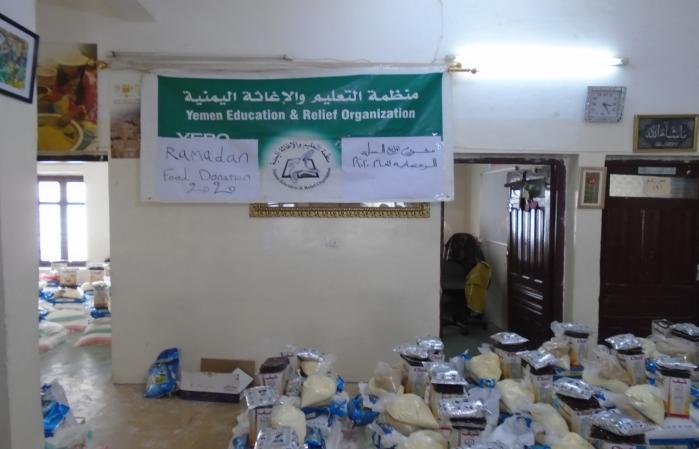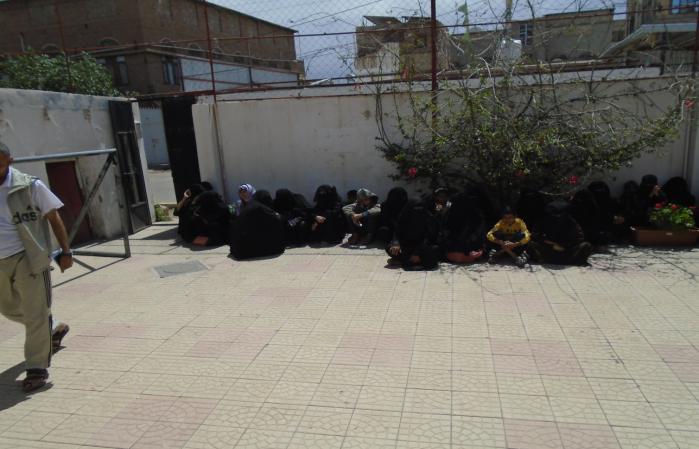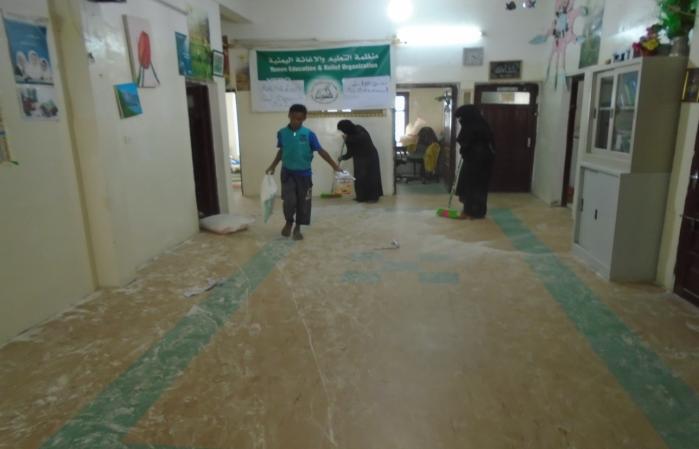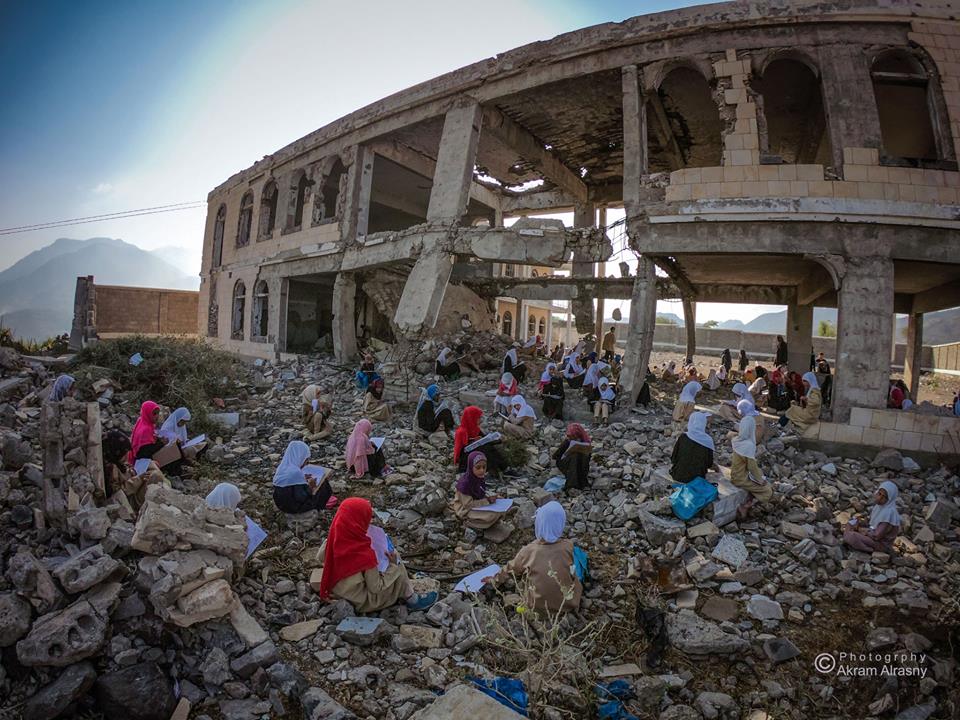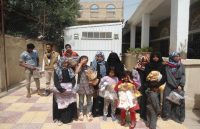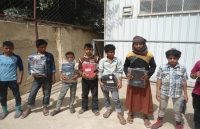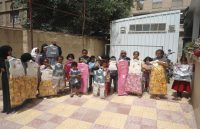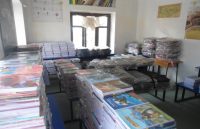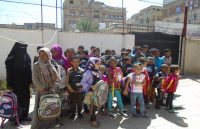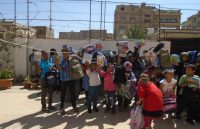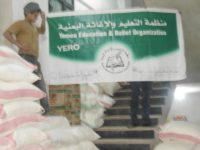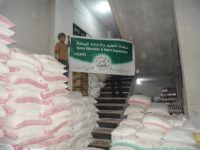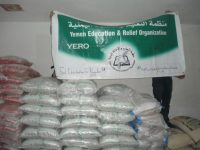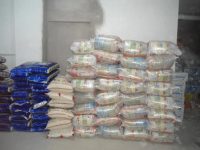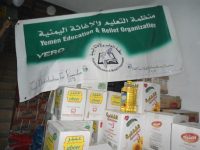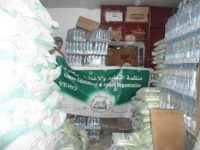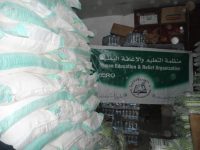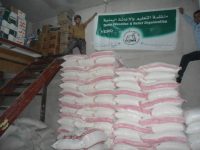Dear Sponsors, Dear Members, Dear Yemen Friends
For once there is nothing political to report (because the Saudis are overburdened with their oil problems and do not bomb, and all our YERO children are well).
Here the coronavirus is raging and ties us to the house.
So maybe you have time to read a fairy tale from Yemen?
With very kind regards
Anisa
Ein Märchen aus dem Jemen
Die Tochter des Königs der Dschinn des Ostens und der Sohn des Königs der Dschinn des Westens
([1])
Es war einmal vor langer, langer Zeit, ihr Herren und ehrenwerten Leute, da gab es eine Tochter des Königs der Dschinn des Ostens und einen jungen Mann, Sohn des Königs der Dschinn des Westens. Als die Tochter des Königs der Dschinn des Ostens volljährig geworden war, freundete sie sich mit der – menschlichen – Tochter des Sultans des Ostens an. Dieses Mädchen, so schön war es, dass sein Anblick einen jeden verwirrte, und sein Gang einen jeden, der den Propheten ( gesegnet sei er, Allahs Gnade über ihn und sein Segen) liebt, gefangen nahm, sein Herz zum Sklaven machte und ihn selbst zum Bettler.
Bald waren die Freundinnen einander zugetan wie Geschwister.
Gleiches geschah dem Sohn des Königs der Dschinn des Westens. Er freundete sich an mit dem Sohn des Sultans des Westens. Beide verstanden sich wie Brüder und verbrachten ihre Zeit gemeinsam mit Reiten, Kampf und sportlichen Spielen. Stark und gewandt waren sie und von klugem Verstand.
Eines Tages wollte es der Zufall, dass der Sohn des Königs der Dschinn des Westens die Tochter des Königs der Dschinn des Ostens traf. „Woher kommst du?“ fragte er sie. „Ich komme von meiner Freundin, der Tochter des Sultans des Ostens, meiner allerbesten Freundin! Und woher kommst du?“
„Ich komme von meinem engsten Freunde, dem Sohn des Sultans des Westens. Kein anderer junger Fürst sieht so gut aus wie er und für mich ist er wie mein eigener Bruder“. „Das gibt es in der ganzen Welt nicht, jemand der schöner aussieht und besser ist als meine Freundin“, gab ihm die Tochter des Königs der Dschinn des Ostens zur Antwort. „Du lügst“, sagte daraufhin der Sohn des Königs der Dschinn des Westens, „mein Freund, der Sohn des Sultans des Westens, ist schöner und besser als irgendjemand sonst in der Welt!“
Nachdem sie eine Zeitlang so hin und her gestritten hatten, beschlossen sie, den Sohn des Sultans des Westens und die Tochter des Sultans des Ostens nebeneinander zu stellen, um dann den Beweis führen zu können, wer von den beiden besser und schöner sei, und machten auch sogleich einen Zeitpunkt für die Gegenüberstellung aus.
Am festgesetzten Tag brachten der Sohn des Königs der Dschinn des Westens und die Tochter des Königs der Dschinn des Ostens den jungen Sohn des Sultans des Westens in das Haus der Tochter des Sultans des Ostens, wo sie den schönen Jüngling auf das Bett der Tochter des Sultans des Ostens legten, wo die schöne Sultanstochter schlief. Der Sohn des Königs der Dschinn des Westens und die Tochter des Königs der Dschinn des Ostens versteckten sich, niemand konnte sie sehen. Als der Sohn des Sultans des Westens aufwachte, wunderte er sich sehr über das schöne Mädchen an seiner Seite, Ach, sprach er zu sich, diese schöne Baut muss mir mein Vatter gebracht haben, sie ist über alle Maßen wunderbar, warum aber warum nur hat mein Vater vorher nichts davon berichtet?
Nun bat die Tochter der Dschinn des Ostens den Sohn des Königs der Dschinn des Westens, den Jüngling wieder in Schlaf zu versetzen, weil sie jetzt ihre Freundin aufwecken wollte. Als die Tochter des Sultans des Ostens ihre Augen aufschlug, entdeckte sie einen gutaussehenden jungen Mann neben sich. Zuerst wollt sie ihren Augen nicht trauen und fragte sich: was hat Allah mit diesem schönen jungen Mann vor, wo kommt er her? Den muss mir mein Vater gebracht haben! Weil ich nicht heiraten wollte, hat mein Vater mir den da als Bräutigam ausgesucht. Am besten nehme ich ihm gleich mal seinen Ring ab und stecke ihm meinen zur Erinnerung an! Sie versuchte nun, ihn aufzuwecken, doch er war – wie ich schon erzählt habe – verzaubert vom jungen Dschinn.
Die beiden Dschinn hatten nun also beobachtet, wie sich die Tochter des Sultans des Ostens verhalten hatte und wie sie den Sohn des Sultans des Westens liebte. Sie ließen die Tochter des Sultans des Ostens wieder einschlafen und fingen erneut an zu streiten. „ ich bin der Sieger“, sagte der Sohn des Königs der Dschinn des Westens, „weil mein Freund, als er deine Freundin sah, Vernunft zeigte und Verstand. Deine Freundin aber, als sie meinen Freund bemerkte, hat sich auf den ersten Blick in ihn verliebt. Und darum habe ich unsere Wette gewonnen.“
„Ja, recht hast du, meine Freundin handelt übereilig und nicht so vernünftig wie dein Freund. Ja, ich muss wiederholen, du hast die Wette gewonnen“ Und nun brachten sie den Sohn des Sultans des Westens, der immer noch unter dem Einfluss des Bann stand, zurück in das Schloss seines Vaters.
Als der Sohn des Sultans des Westens am nächsten Morgen aufwachte, wies er sein Frühstück zurück und bat seine Mutter, sie möge doch den Sultan zu ihm in sein Schlafzimmer bitten, er sei krank und müde. Der Sultan erschien und hörte folgende Rede: „Wo ist denn das schöne Mädchen, das du mir gestern gebracht hast? Keine andere will ich zur Frau als dieses Mädchen! Früher, Vater, hast du immer vom Heiraten gesprochen und eine jede habe ich abgelehnt, doch dieses Mädchen von gestern, das will ich heiraten, noch heute, auf der Stele!“
Der Sultan war ganz verwundert: „ Aber mein Sohn, ich habe Dir gestern Abend keine Braut und nichts dergleichen gebracht! Du musst einen Traum gehabt haben. Aber sorge dich nicht, deine Mutter und ich, wir werden dir eine süße Braut zur ehrenwerten Ehefrau aussuchen!“
„Vater, hör zu, keine andere will ich außer dem Mädchen, das du mir gestern Abend gebracht hast, niemanden sonst! Lach nicht über mich und denke nicht, ich hätte geträumt, oder ich sei verrückt geworden. Niemals! Mit all meinen Gefühlen und mit meinem Verstand will ich nichts als dieses schöne Mädchen, nach ihm allein steht mein ganzes Sinnen!“
Der Sultan des Westens glaubte indes, sein Sohn sei krank und träume, und noch lange versuchte er, ihn zu beruhigen, doch ohne Erfolg. Da rief der Sultan des Westens seine Minister und seine übrigen Berater zu einer Sitzung in sein wohlgebautes Schloss. Sie schlugen vor, den Jüngling selbst seine Geschichte vortragen zu lassen. Der junge Mann wurde gebracht und er wiederholte: „Das Mädchen will ich, das mir mein Vater in der Nacht gebracht hat und das er neben mich gelegt hat. Es stimmt, was ich euch sage, ich bin nicht verrückt, ich träume nicht, ich sage nur die Wahrheit, nichts als die Wahrheit!“
Da wandte sich einer der Männer des Sultans an den jungen Mann: „Des Teufels böser Blick hat Dich getroffen, mein Sohn, aber dein Vater wird dich verheiraten mit dem schönsten Mädchen im Lande. Doch lass jetzt diese Rede, die doch nichts bringt und spinne diese Gedanken nicht ständig weiter.“ Da gab ihm der Jüngling zur Antwort: „Kommst auch du mit dieser Rede und sprichst, wie wenn ich von Sinnen wäre! Nein, niemals, keine andere will ich, nur das Mädchen, das mein Vater gestern Abend in mein Zimmer gebracht hat und das ich in Fleisch und Blut gesehen habe, und in all seiner bezaubernden Schönheit!“
Jetzt war der Sultan des Westens überzeugt, dass sein Sohn verzaubert oder krank im Geiste sei und dass er einem Traumbild nachhing.
Im Osten aber ging es der Tochter des Sultans ähnlich. Erst wollte sie ihr Frühstück nicht essen, dann rief sie ihre Mutter und bat, mit ihrem Vater reden zu dürfen. Das Mädchen war so unglücklich, dass seine Mutter Angst um seine Gesundheit bekam und auf der Stelle zu ihrem Mann, dem Sultan, ging. Als nun beide zurückkehrten, rief ihnen die Tochter schon entgegen: „Wo ist er denn, Vater, der junge Mann, den du mir gestern Abend gebracht hast, schön ist er und, ach, ich liebe ihn so. Ich bitte dich, bringe ihn auf der Stelle wieder her. Du erinnerst dich doch, Vater, immer in der Vergangenheit, wenn du mir jemand als Brautwerber vorgestellt hast, habe ich abgelehnt. Jetzt aber habe ich mich auf den ersten Blick verliebt in diesen jungen Mann, den du mir gestern Abend gebracht hast, und wirklich, schön ist er und niemals hat mein Auge einen wie ihn gesehen!“
Der Sultan wurde über diese Rede sehr zornig und glaubte, seine Tochter sei krank oder habe in der Nacht einen schlimmen Traum geträumt, den sie jetzt wie etwas wirklich Vorgefallenes ansehe. Was ihn aber am meisten aufbrachte, war ihre Behauptung, er selbst, der Sultan, habe ihr einen schönen fremden Jüngling ins Bett gelegt! Der Sultan des Ostens ließ seine Minister und Ratgeber rufen und bat sie um ihren Ratschlag. Auch hier wurde das Mädchen geholt, doch es bestand auf seiner Erzählung. Da waren sich alle einig, dass das Mädchen krank im Geiste geworden sei. Ihr Vater ließ alle Ärzte des Landes rufen, doch keiner vermochte es zu heilen. Da beschloss der Sultan, seine Tochter müsse gesund werden, auf welchem Weg auch immer. Er ließ den Ausschreier rufen und befahl ihm, vor allen Leuten zu verkünden:
„Kundgetan sei hiermit allen, wer eine Arznei für die Tochter des Sultans hat und si zu heilen vermag, dessen Lohn wird sein die Ehe mit ihr. Wer aber versucht und ohne Erfolg bleibt, dem wird zur Strafe der Kopf abgeschlagen, auf dem großen Platz.“
Viele kamen und versuchten sich an der Heilung der Tochter des Sultans, doch ohne Erfolg. Und ihrer aller Los war die Strafe der Enthauptung, unter den Augen des Volkes auf dem großen Platz. Tage gingen, Tage kamen, der Reinste der Menschen (Mohammed) sei gesegnet. Da kam ein gelehrter Mann in das Schloss des Sultans und sprach: „Ich bin nicht gekommen, wie die anderen, um deine Tochter zu heilen, nur einen Ratschlag will ich dir geben! O du Sultan der Zeit, bau deiner Tochter ein Schloss am Strande des Meeres, gib ihr Diener und Helfer und alles, was sie sich nur wünschen mag, und lass sie sich erholen für eine lange Weile. So Allah will, wird sich ihr Zustand bessern und ihre Gesundheit wiederkehren.“
Da ließ der Sultan ein prächtiges Schloss am Strande des Meeres errichten und schickte all die Diener, die der gelehrte Mann vorgeschlagen hatte.
Auch dem Sultan des Westens gab ein gelehrter Mann einen Rat: „ Hoheit, o Sultan, wie es scheint, liegt die Krankheit deines Sohnes in seinem Herzen. Eine Seereise wäre ihm zu nutzen, bei der er alle Länder bereist. So wird ihm seine Gesundheit wiederkehren, und er wird sein wie früher, und noch viel besser.“
So unglücklich war der Sultan des Westens, dass er mit allem einverstanden war, damit Allah seinen Sohn von der Krankheit, die ihn befallen hatte, heile. Er gab den Befehl, ein großes Schiff auszurüsten, voll mit Proviant, Getränken, und allem sonst, was man auf einer langen Reise braucht. Eine Mannschaft starker Männer wurde ausgesucht, die sollten das Schiff sicher führen über die hohen Wogen der See.
Der Sohn des Sultans des Westens, den alle Leute für krank hielten, bestieg das große Schiff und segelte davon. Sobald sie ein fremdes Land erreichten, legten sie an, der Sohn des Sultans verließ das Schiff und besuchte das Land. Das ging so eine ganze Zeit lang.
Eines Tages nun kam das Schiff in einen Hafen und ging dort, wie stets, vor Anker. Der Sohn des Sultans begab sich an Land, um umherzustreifen. Plötzlich erblickte er ein schönes, großes Schloss und erkundigte sich, wem es gehöre. „ Das ist das Schloss der Tochter unseres Sultans! Krank ist sie und keine Arznei und keine Heilung hat man für sie gefunden. Viele haben es versucht, doch alle sind ohne Erfolg geblieben, und mehr als 60 Männern ließ der Sultan den Kopf abschlagen, so wollte es die Bedingung zwischen ihnen und dem Sultan. Diese Bedingung aber lautet, wer die Tochter des Sultans heilt, dem gibt er sie zur Frau. Wer aber ohne Erfolg bleibt, dessen Lohn ist der Tod durch das Schwert.“
Da sprach der Sohn des Sultans des Westens, er könne dieses Mädchen heilen! Doch die Leute rieten ihm, seine Absicht aufzugeben, denn sein Schicksal werde das gleiche sein wie das all der anderen, deren Häupter der Sultan habe abschlagen lassen. Dennoch ließ sich der Jüngling nicht umstimmen. „Ich kann dieses Mädchen heilen“, sagte er, und begab sich zum Schloss.
Beim Schloss am Strande des Meeres angekommen, rief er laut: „Ich bin der Arzt, der Heiler Allahs bin ich!“. Zu diesem Augenblick besuchte der Sultan gerade seine Tochter und ließ den jungen Mann rufen. Der Sohn des Sultans des Westens erschien vor dem Sultan des Ostens und hörte die Bedingungen. Ja, er sei einverstanden, und – ganz ungeduldig – hoffe er, die Gesundheit des Mädchens wiederherstellen zu können. Doch der Sultan hatte in seinem Herzen Mitleid mit dem jungen Mann und sprach zu ihm: „Was ist mit dir, mein Sohn? Warum willst du dich dem Tode weihen? Du bist ein so angenehmer junger Mensch. Man spürt, du stammst aus guter Familie, warum willst du diese Aufgabe versuchen? Denn wenn du ohne Erfolg bleibst, wird dir dein Haupt abgeschlagen werden, wenn du aber dein Ziel erreichst, dann werde ich dich mit meiner geliebten Tochter verheiraten!“ – „Ich bin einverstanden, Hoheit, so Allah will, werde ich Erfolg haben und deiner Tochter die Gesundheit zurückgeben, und sie wird so sein wie früher, und noch viel besser!“
Der Sultan, der Sohn des Sultans des Westens und das ganze Gefolge betraten das Zimmer des kranken jungen Mädchens. Da saß es auf einer schönen, bequemen Liegebank, schaute nicht auf und sprach kein einziges Wort. Der Sohn des Sultans aber sah sie und erkannte sie sofort. Er bat ihren Vater, alle Leute aus dem Zimmer zu weisen und als jetzt noch nur die beiden jungen Leute im Zimmer waren, da erkannte auch sie ihren Geliebten, stand auf, ging dem jungen Mann entgegen und sprach ihn an: „Du da – der?“? – „Und du da – die!“ „Wo bist du all diese Zeit gewesen?“ „Ich war bei dem, dem dieser Ring gehört!“ – „Und ich war bei der, der dieser Ring gehört!“ – „Allah, der alles verbindet, sei Preis! Aber nun hör zu, du, hast du denn keinen Hunger“ – „Ja!“ – „Ich auch, so viele Tage lang habe ich schon nicht mehr gegessen!“
Das Mädchen rief den Dienern zu: „Holt schnell etwas zu essen und bringt Wasser zum Trinken!“. Und die beiden jungen Leute, das Mädchen und der Sohn des Sultans des Westens, fielen über das Essen her.
Am nächsten Morgen kam ihr Vater, der Sultan, um sich Gewissheit über das Ergebnis zu verschaffen, und als er sah, wie das Mädchen sein früheres Wesen ganz und gar wiedergewonnen hatte, da freute er sich sehr und mit ihm die ganze Familie. Der Sultan erfüllte sein Versprechen und stand zu seiner Bedingung. Am Abend lud der Sultan des Ostens deshalb alle ein, um den Ehevertrag zu schließen. Als der Kadi den jungen Mann nach seinem vollständigen Namen und nach seiner Herkunft fragte, erfuhren alle, dass er der Sohn des Sultans des Westens war.
„O welche Freude, ein Willkommen dem Sohn des Sultans des Westens, wie glücklich bin ich darüber, dass du so klug und mutig warst, und meine Tochter von ihrer Krankheit geheilt hast. Aus der Tiefe meines Herzens heraus bin ich glücklich, dich mit meiner geliebten Tochter verheiraten zu können. Dein Schwiegervater bin ich jetzt, ich, der Sultan aller Länder des Ostens!“
Dann wurde die Hochzeit gefeiert, sieben Tage lang, und alle Söhne des Landes freuten sich sehr, weil die Tochter ihres Sultans von der Krankheit genesen war und weil sie den Sohn des Sultans des Westens zum Manne nahm.
Ein ganzes Jahr lang blieb der Sohn des Sultans des Westens bei seiner Frau, und am Ende des Jahres wurde ihnen ein prächtiger Sohn geboren. Jetzt aber bat der Sohn des Sultans des Westens seinen Schwiegervater, Lebewohl sagen zu dürfen, bestieg mit Frau und Sohn sein Schiff und segelte in Eile zurück in den Westen. Heimgekehrt in das Land des Westens bereiteten ihm sein Vater und seine Mutter und seine Verwandten in ihrer Freude einen großen Empfang. Der Sultan des Westens lud alle Einwohner der Stadt zu dem Fest und alle waren glücklich, weil ihr Sultan gerecht, freigiebig und ehrenwert war. Und alle lebten ihr ganzes Leben lang in Freude und Glück, zeugten Söhne und Töchter.
[1] Aus „ Märchen aus dem Jemen“ von Werner Daum, 1999, S.119 ff
